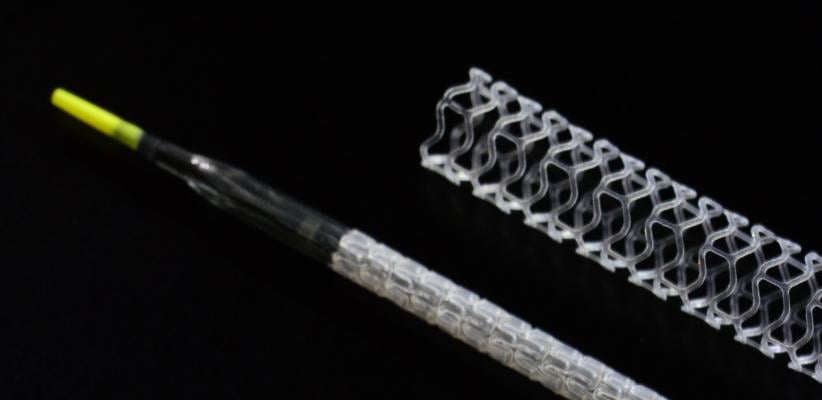
October 1, 2018 — New results from the RENASCENT studies presented at the Transcatheter Cardiovascular Therapeutics (TCT) conference showed Amaranth Medical’s Magnitude sirolimus-eluting bioresorbable scaffold (BRS) continued to perform well clinically at nine months.
Antonio Colombo, M.D., director of the Hemodynamics Division at Ospedale San Raffaele in Milan, Italy and co-principal investigator of the RENASCENT studies, presented nine-month follow-up results of the 70 patients implanted with Magnitude, the company’s 98-micron BRS. Dr. Colombo noted, “At nine months, Magnitude continues to perform clinically well and it sets a new standard for thin-strutted scaffold performance. The Magnitude BRS displays similar mechanical performance compared to metallic drug-eluting stent (DES) not requiring changes in the implantation technique. We are approaching a new phase in the investigation of this device with plans to conduct a larger head-to-head comparative study against metallic DES.”
At their nine-month follow-up visit, patients who received the Magnitude BRS in the international, multi-center RENASCENT III study experienced a low rate of peri-procedural major adverse cardiac events (2.9 percent MACE) and a binary restenosis rate of 4.5 percent. Optical coherence tomography (OCT) showed nearly complete strut coverage (97 percent) and low rate of strut malapposition (0.2 percent). In addition, metallic-stent-like scaffold area was observed after implantation and maintained at the nine-month follow-up visit, demonstrating sustainable mechanical stability.
Juan F. Granada, M.D., co-principal investigator of the Amaranth studies, presented on the company’s wide range of scaffolds with progressively reduced strut thickness currently being evaluated in clinical trials. Granada also provided an update on Defiance, which Amaranth Medical calls the world’s thinnest BRS at 85 microns. Granada commented, “Amaranth’s preclinical DEFIANCE results continue to demonstrate that miniaturization of strut thickness is technologically achievable without affecting mechanical performance. Reducing strut thickness to the 85-micron range has the potential to impact healing response and restenosis favorably and overcome the issues encountered with first generation BRS. I am eager to see this device tested in clinical trials soon.”
Three-year follow-up results, including safety and angiographic findings, from the clinical study of Fortitude, Amaranth’s 150-micron BRS, and Aptitude 115- micron BRS were presented at the company’s symposium by Alaide Chieffo, M.D., the research director of the Interventional Cardiology Unit at Ospedale San Raffaele in Milan, Italy. These results demonstrate high clinical success rate, low MACE rate and almost complete strut coverage at nine months.
Amaranth Medical CEO Kamal Ramzipoor said the company expected to receive CE Mark for Aptitude by the end of 2018 and Magnitude by Q1 2019.
For more information: www.amaranthmedical.com


 January 05, 2026
January 05, 2026 









